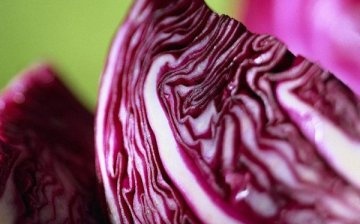Useful properties of red cabbage
Cabbage is one of the natural sources for our body, nourishing it with vitamins, trace elements and other useful substances. Moreover, it can be very tasty if prepared by the skilled hand of the chef. As children, we happily chewed the sweet crispy leaves of the first cabbage harvest instead of chips or seeds. They began to grow it as a cultivated plant as early as 4000 BC and today we have several varieties that differ in appearance, taste and useful properties.
Red cabbage does not have early varieties. It ripens late and therefore has a more rigid structure. Since ancient times, cabbage has been used as a medicine. Then people had practical knowledge of herbal medicine, not being able to go to the pharmacy and buy "something from the head."
Red cabbage, like its close relative, white cabbage contains a lot of fiber, which is used to correct the diet of people with diabetes, overweight, as well as various disorders of the stomach, intestines, and other organs and systems. Calcium, iron, phosphorus and many other trace elements, as well as useful lactic acid, are found in cabbage leaves.
Red cabbage has some advantages over other types of this plant. It contains the most selenium, which is actively involved in the life of cells. Its purple and violet color is given by anthocyanin - a substance that strengthens blood vessels and prevents leukemia.
The beneficial properties of red cabbage make it indispensable for lowering blood pressure. Due to the high content of phytoncides, it will help the body prevent the development of tubercle bacilli. It is widely used to treat chronic bronchitis. Eat this variety for the prevention of various cardiovascular diseases and simply for a variety of healthy food choices on your table.




I read somewhere that women who regularly consume red cabbage are 50% less likely to get breast cancer due to the antioxidant glucosinolate in it. I wonder if this is true?
I read somewhere that women who regularly consume red cabbage are 50% less likely to get breast cancer due to the antioxidant glucosinolate in it. I wonder if this is true?